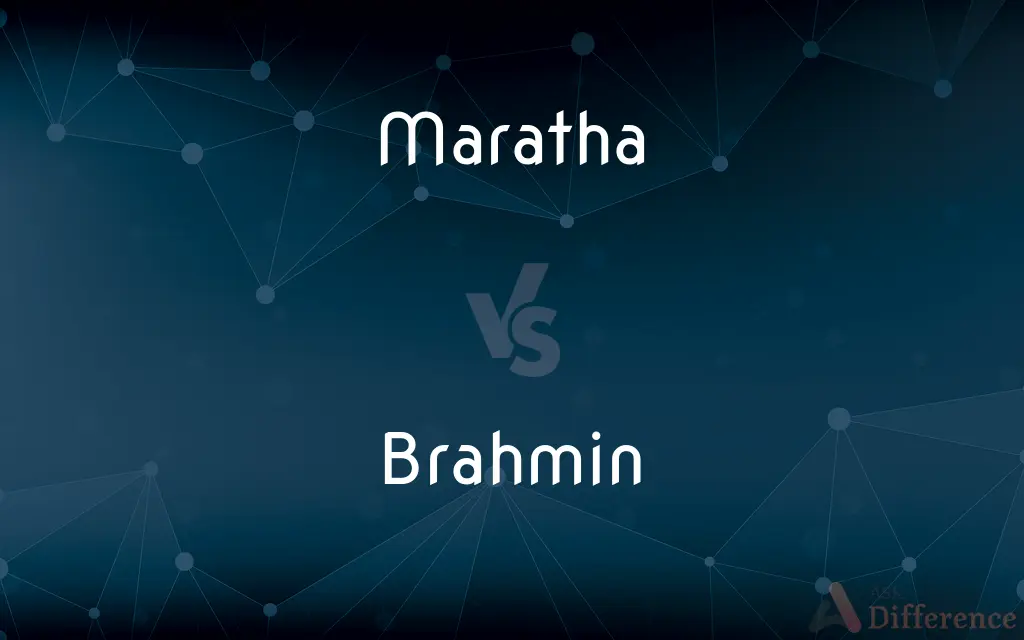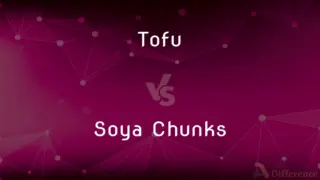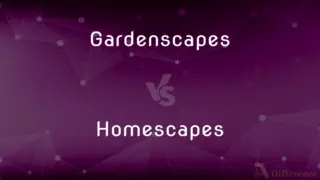Maratha vs. Brahmin — What's the Difference?
By Tayyaba Rehman — Published on January 25, 2024
Marathas are a prominent warrior and farming community from Maharashtra, India, while Brahmins are a Hindu caste traditionally associated with priesthood and learning.

Difference Between Maratha and Brahmin
Table of Contents
ADVERTISEMENT
Key Differences
The Marathas are an ethnolinguistic group primarily from the state of Maharashtra in India, known historically for their warrior and agricultural roles. The Brahmins, on the other hand, are one of the varnas (castes) in Hinduism, traditionally focused on scholarly and priestly duties.
Historically, the Marathas played a significant role in Indian history, especially in the 17th century under the leadership of Shivaji Maharaj, establishing a strong Maratha empire. Brahmins have been influential in the religious and cultural spheres of India, known for their roles in religious rituals, teaching, and learning.
In the caste system of Hinduism, Brahmins are considered the highest caste, primarily responsible for religious rituals and teachings. Marathas, although primarily warriors and farmers, have varied caste designations and are known for their martial prowess.
Marathas have a distinct culture, language (Marathi), and social traditions that are integral to the state of Maharashtra. Brahmins, spread across India, are diverse in their practices and customs, with variations based on regional and linguistic differences.
The distinction between Marathas and Brahmins is not just in their historical roles but also in their cultural, social, and religious practices, reflecting the diversity of Indian society.
ADVERTISEMENT
Comparison Chart
Primary Identity
Warrior and farming community
Priestly and scholarly caste
Historical Role
Warriors, key figures in Maratha Empire
Priests, scholars, teachers in Hindu society
Social Status
Varied caste designations, known for martial skills
Considered the highest caste in Hinduism
Culture and Language
Marathi-speaking, unique cultural practices
Diverse, with practices varying regionally
Geographical Origin
Primarily from Maharashtra, India
Spread across various regions of India
Compare with Definitions
Maratha
Native to Maharashtra and speakers of the Marathi language.
Marathi is the mother tongue of the Maratha people.
Brahmin
A Hindu caste traditionally associated with priesthood and learning.
Brahmins have historically been the custodians of Hindu religious rituals.
Maratha
A community with a strong agricultural background.
Agriculture has been a traditional occupation in the Maratha community.
Brahmin
Spread across India, diverse in practices based on region.
Brahmins in different regions of India have their unique customs and traditions.
Maratha
An Indian warrior group known for their role in the Maratha Empire.
The Maratha warriors played a pivotal role in shaping Indian history.
Brahmin
Considered the highest caste in the Hindu varna system.
Brahmins are revered in Hindu society for their spiritual knowledge.
Maratha
Known for their military tactics and administration in history.
The Maratha administration was renowned for its efficiency.
Brahmin
Involved in teaching, scholarly activities, and religious duties.
Many Brahmins dedicate their lives to scriptural study and teaching.
Maratha
Have diverse caste designations within the community.
The Maratha community consists of several sub-castes and groups.
Brahmin
Influential in the cultural and religious spheres of Indian society.
Brahmins have played a significant role in shaping Indian culture and religion.
Maratha
A member of a traditionally Hindu people inhabiting Maharashtra state in India.
Brahmin
Also Brah·man (-mən) A member of the highest of the four major castes of traditional Indian society, responsible for officiating at religious rites and studying and teaching the Vedas.
Maratha
A member of a people of India living in Maharashtra
Brahmin
A member of a cultural and social elite, especially of that formed by descendants of old New England families
A Boston Brahmin.
Brahmin
Variant of Brahman.
Brahmin
Also Brahman (-mən) Of or relating to the caste of Brahmins.
Brahmin
A member of the Hindu priestly caste, one of the four varnas or social groups based on occupation in ancient Hindu society.
Brahmin
One who has realized or attempts to realize Brahman, i.e. God or supreme knowledge.
Brahmin
A scholar, teacher, priest, intellectual, researcher, scientist, knowledge-seeker, or knowledge worker.
Brahmin
A member of a social and cultural elite, especially in the New England region of the USA.
Brahmin
A learned person of refined taste and mild manners.
Brahmin
Scholarly.
Brahmin
A member of a social and cultural elite (especially a descendant of an old New England family);
A Boston Brahman
Brahmin
A member of the highest of the four Hindu varnas;
Originally all brahmans were priests
Brahmin
The highest of the four varnas: the priestly or sacerdotal category
Brahmin
Any of several breeds of Indian cattle; especially a large American heat and tick resistant grayish humped breed evolved in the Gulf States by interbreeding Indian cattle and now used chiefly for crossbreeding
Common Curiosities
What is the Brahmin caste known for in the Hindu varna system?
In the Hindu varna system, Brahmins are known as the highest caste, primarily associated with priesthood and scholarship.
Who are the Marathas?
The Marathas are an ethnolinguistic group known for their warrior history and agricultural background, primarily from Maharashtra, India.
Were Marathas rulers in Indian history?
Yes, the Marathas established a powerful empire in India, particularly under Shivaji Maharaj's leadership.
Do Marathas have a distinct language?
Yes, Marathas primarily speak Marathi, which is native to the state of Maharashtra.
Is Maratha a caste or a community?
Maratha is more accurately described as a community with varied caste designations within it, known for their warrior and farming background.
Are Brahmins only found in certain parts of India?
Brahmins are spread across various regions of India and have diverse customs and practices influenced by regional differences.
Do Brahmins speak a specific language?
Brahmins do not have a specific language; they speak the regional languages of the areas they reside in across India.
What is the traditional role of Brahmins?
Brahmins traditionally fulfill roles as priests, scholars, and teachers in Hindu society.
Are there different groups within the Maratha community?
Yes, the Maratha community consists of several sub-castes and groups with diverse cultural practices.
Are Brahmins still influential in contemporary Indian society?
Brahmins continue to be influential in various aspects of Indian society, especially in the cultural and religious spheres.
Did the Marathas have a specific style of governance?
The Marathas were known for their efficient administration and military tactics during the Maratha Empire.
Have the roles of Marathas and Brahmins evolved in modern India?
In modern India, both Marathas and Brahmins have diversified into various professions and roles, extending beyond their traditional historical and societal functions.
Can Brahmins be involved in occupations other than priesthood?
Yes, while traditionally associated with priesthood and learning, Brahmins can be found in various modern professions.
How are Brahmins involved in Hindu rituals?
Brahmins traditionally perform and officiate various Hindu religious rituals and ceremonies.
What is the significance of the Maratha Empire in Indian history?
The Maratha Empire played a crucial role in resisting Mughal rule in India and shaping the country's political landscape in the 17th and 18th centuries.
Share Your Discovery

Previous Comparison
Tofu vs. Soya Chunks
Next Comparison
Gardenscapes vs. HomescapesAuthor Spotlight
Written by
Tayyaba RehmanTayyaba Rehman is a distinguished writer, currently serving as a primary contributor to askdifference.com. As a researcher in semantics and etymology, Tayyaba's passion for the complexity of languages and their distinctions has found a perfect home on the platform. Tayyaba delves into the intricacies of language, distinguishing between commonly confused words and phrases, thereby providing clarity for readers worldwide.













































